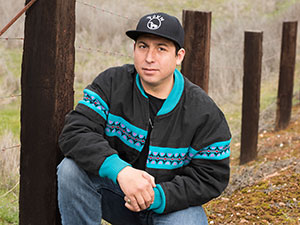
Tommy Orange, a Native American writer whose New York Times bestselling debut novel, "There, There," was nominated for the 2019 Pulitzer Prize, will give a free public reading from his book Thursday, March 3, at the University of Wyoming.
Orange, an enrolled member of the Cheyenne and Arapaho tribes of Oklahoma, will read from his novel at 6 p.m. in the Buchanan Center for the Performing Arts Thrust Theatre. "An Evening with Tommy Orange" will be followed by a moderated onstage question-and-answer session.
The program also will be livestreamed via UW's WyoCast system at https://wyocast.uwyo.edu/WyoCast/Play/8d8f11f63a3c4dfa837e5c75372a50fd1d.
Earlier that same day, at 2 p.m., a free public informal question-and-answer session with Orange is scheduled in UW's Cooper Carriage House, located near the corner of Grand Avenue and 15th Street. The session will loosely focus on storytelling.
The program will be co-moderated by Melvin Arthur, an associate research scientist in the UW Division of Kinesiology and Health, who also is affiliated with UW's Native American and Indigenous Studies (NAIS). Caio Driver, an MFA fiction writer in the UW Creative Writing Program, will be the other co-moderator.
"There, There" was among The New York Times Book Review's 10 Best Books of 2018 and won the Center for Fiction First Novel Prize that same year. Orange's novel also received the National Book Critics Circle John Leonard Prize and the PEN/Hemingway Award. The novel was longlisted for the National Book Awards; shortlisted for the Andrew Carnegie Medal for Excellence in Fiction; won the Dayton Literary Peace Prize; and was a Pulitzer Prize finalist.
The book is an outgrowth of Orange's work in digital storytelling at the Native American Health Center in Oakland, Calif. It is a multigenerational story about the lives of urban Native Americans. The novel offers a "chorus of voices" struggling with questions of identity and authenticity through 12 Native American characters traveling to the Big Oakland Powwow. The novel's characters grapple with a "complex and painful history, with an inheritance of beauty and spirituality, with communion and sacrifice, and with heroism," according to the book.
"As an Arapaho, I know that the future of my people is dependent on stories and the role stories will hold in terms of community well-being," says Arthur, who also is a leader of qualitative assessment for Growing Resilience.
Orange's continued efforts in digital storytelling is an added attraction for UW researchers involved in the Growing Resilience project, a community-based participatory effort to bring home gardens to households on the Wind River Indian Reservation in Fremont County. The program promotes family health.
"Colleagues and participants in health action research I lead have shown me that storytelling far eclipses physical measurements in illuminating well-being," says Christine Porter, principal investigator of Growing Resilience. Porter also is a professor and the Wyoming Excellence Chair in Community and Public Health in the UW Division of Kinesiology and Health.
Orange graduated from the MFA program at the Institute of American Indian Arts in Santa Fe, N.M. He was a 2014 MacDowell Fellow and a 2016 Writing by Writers Fellow. He was born and raised in Oakland.
"I'm excited about Tommy Orange's visit to the UW campus because it recognizes a particular shift in our cultural community about who we choose to recognize as important artists," says Cassandra Hunter, assistant director at the Albany County Public Library.
Event sponsors are UW's Department of Visual and Literary Arts; NAIS; the Native American Program; the Native student group, Keepers of the Fire; Department of English; College of Arts and Sciences; the Wyoming Institute for Humanities Research; and the School of Culture, Gender and Social Justice.






